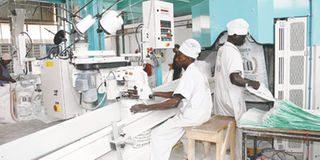Sido plans to industrialise TZ

Factory workers. Sido says it will support industrialisation. PHOTO|FILE
What you need to know:
Currently, industries and construction contribute about 23 per cent to the gross domestic product (GDP) but the government through its vision 2025 aims to elevate the sector to at least 40 per cent.
Dar es Salaam. Industrialisation has been one of the agendas of the current government as a way to improve job creation and accelerate economic growth.
Currently, industries and construction contribute about 23 per cent to the gross domestic product (GDP) but the government through its vision 2025 aims to elevate the sector to at least 40 per cent.
The Small Industries Development Organisation (Sido) says it is supporting the government plans for industrialisation.
Sido’s plans focus on five key areas that cannot only facilitate movement of micro industries to medium enterprises but also increase economic growth according to Sido director general Omar Bakari.
“The industrialisation strategy in Tanzania started immediately after independence, focusing on basic and strategic industrialisation and integrated industrial strategies.
However, the country has not achieved much in terms of contribution to GDP,” he told BusinessWeek.
“The country has an opportunity to do the best based on global dynamics that are good for Tanzania including labour markets and new discoveries within the country,” he said.
He said Tanzania had a chance to have cheaper labour compared with other countries and that discovery of oil and gas was another opportunity to develop other industries in the value-addition chain.
The National Perspective Research conducted three years ago showed that there are five million small enterprises in the country but a pilot survey by Sido showed that more than 500,000 enterprises receive service from the organisation.
Five key areas of focus
Sido is planning to enhance innovation and competitiveness among the industries through creating different programmes that comprise rapid incubation.
For the industries to be more competitive it would reduce operation costs through creating or developing SME packs which will facilitate agglomerations of sector-based industries which will result in new product innovations.
The SME package centre has been a great challenge for small scale industries for many decades now.
“With the establishment of the centre it will provide different services including labelling, printing and production of some varieties of packaging materials,” he said.
Mr Bakari said another plan is to enhance capability of accessing and using market information after finalising a new project that entails development of an SME portal which will facilitate easy access to information to buyers and sellers in the market platform.
He named another key area as enhancing financial service delivery.
Sido is also planning to come up with a new service for producing guarantee services to the banking system.
However, he noted that despite efforts to develop small industries they have been facing challenges especially from some of the SMEs that were accommodated in Sido estates being offered heavily subsidised rent to enable them to grow.
He said instead of using the support to grow they feel that the situation will continue and still depend on Sido.




